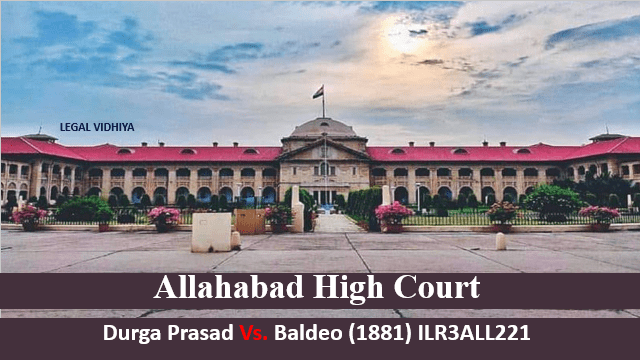
| Citation | ( 1881) 3 Allahabad 221 |
| Date Of Judgment | 3 March 1880 |
| Court | Allahabad High Court |
| Plaintiff | Durga Prasad |
| Defendant | Baldeo |
| Bench | Hon’ble Justice Pearson, Hon’ble Justice Oldfield |
| Appertained | Section 2( d) of the Indian Contract Act |
FACTS OF THE CASE
The complainant was approached by the District Authority of Etawah with the offer to make up a request in the original area. To satisfy the said offer and gain the trust of the defendant, the complainant set up a two- grain request at Etawah, one known by the name Hume Ganj and the other knowns as Ram Ganj, and he’d extended a large number of rupees for erecting shops and buying land for the same. Defendants leased the shops on the lookout and did the work of commission specialists and indeed got some position of commission from the dealers in return.
In 1875 by collective concurrence, the commission to be paid to the complainant was fixed as 6 annas and the defendants executed an arrangement giving effect to the same in 1875. This was done following the wishes of the complainant to be paid only through the mode of commission regularly.
The complainant, on being recommended that he ought to get the agreement for commission registered by the Municipal Corporation, took the matter seriously and latterly arranged for the agreement to be registered to make the agreement fairly binding and have it vindicated for the purposes of their security in respects to entering the commission promised to them.
As per the Indian law and the Indian Contract Act, 1872, for an agreement to be registered, both the parties to the agreement must confirm that they’ve entered into the agreement and have given their full concurrence for the connection of the said agreement.
The issue began at the point when the complainant requested the defendant to give their concurrence for enrollment of the below- said agreement, they responded with either reluctance to give their concurrence for the agreement or denying having to execute it.
As a result of this, the complainant was obliged to sue for the foundation of his rights, and consequently, he brought a suit against the Repliers for enforceability of the understanding in the lower court and later filed an appeal in the High court on the wrong response from the lower court.
Issues involved
Two main issues arose in this case-
• If the below- said agreement constitutes a valid contract
• If the below- said agreement can be enforceable by the law
ARGUMENTS
The complainant contended that The defendant promised to give a 5% commission for all the papers vended through the shop, and the papers have been vended. as the defendant’s consideration of the construction of the structure is there so it makes It a proper contract. So the defendant is supposed to give the 5% commission.
Defendant contention that the construction of the structure was done without the consideration of the defendant. The defendant noway showed any intention to construct the structure. So the contract is invalid.
Judgment
The complainant’s claims were rejected and the case was dismissed by the court. This was done grounded on the fact that there was no prominent and honored consideration involved in this case and hence section 2( d) of the Indian Contract Act, 1872 dismisses the agreement from being honored as a contract. The absence of a consideration redounded in the contract being nominated as a void contract, according to section 25 of the Act. It was also decided by the judges that since the Act specifies the significance of consideration as an essential element for a contract, there lies no chance for an appeal, and the same was dismissed by the court.
The below case is grounded upon section 2( d) of the Indian Contract Act, 1872, which states- “ when at the desire of the pledge, pledge or any other person has done or abstained from doing or does or abstains from doing or pledges to do or to hesitate from doing commodity, similar act or abstinence, or pledge is called a consideration for the pledge. ”
What happened, in this case, was that the complainant honored the offer of the structure of the request as a consideration for the commission to be paid by the defendant to them. Still, the defendant argued on the fact that the construction of the request has nothing to do with the commission being appertained to then by the complainant as he has no way been inclined towards the construction of the structure. And since consideration was absent, the contract can not be nominated as a valid contract. Still, we’d be suitable to identify the absence of the amenability of the defendant to offer a commission grounded on the construction of the request, and this was the base of the complainant’s case, If the break the case into parts. Since the structure was constructed indeed before the involvement of the defendant, he can not be held liable to pay the commission to the complainant.
REFERENCES
https://www.simplekanoon.com/
Written by Varuna an intern under legal vidhiya.




0 Comments